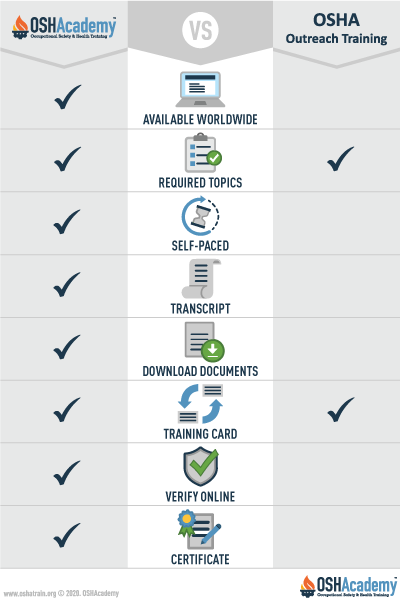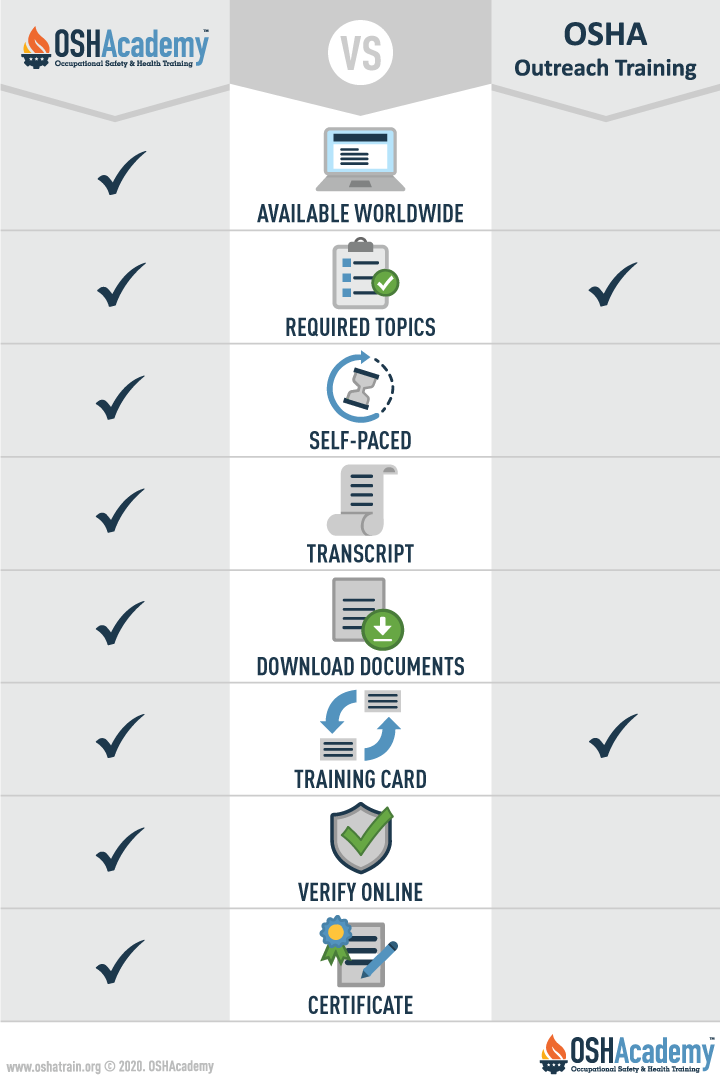| Who should complete 10- and 30-hour training programs? |
About OSHAcademy |
The 10-hour training program is primarily intended for entry level workers. The 30-hour training program is intended to provide workers with some
safety responsibility a greater depth and variety of training. All 10- and 30-hour training is intended to cover an overview of the hazards a worker may encounter on a job site.
Training emphasizes hazard identification, avoidance, control and prevention, not OSHA standards.
|
| What 10- and 30-hour training programs does OSHAcademy provide? |
About OSHAcademy |
General Industry
Construction
|
| Does OSHA require the 10- and 30-hour training programs? |
About OSHAcademy |
No, they are voluntary. OSHA recommends outreach training as an orientation to occupational safety and health for workers.
Important Note: Connecticut, Massachusetts, Missouri, Nevada, New Hampshire, New York, and Rhode Island have enacted laws mandating the training. Also,
some employers, unions, organizations or other jurisdictions may also require this training.
|
| How does OSHAcademy training compare to OSHA (DOL) training? |
About OSHAcademy |
|
| Is OSHAcademy 10- and 30-hour training equivalent to OSHA (DOL) training? |
About OSHAcademy |
Yes.
Our OSHAcademy 10- and 30-hour programs were developed by Steve Geigle, the founder of OSHAcademy and a retired Oregon OSHA trainer. Each program was carefully
designed to provide training content equivalent to the OSHA (DOL) Outreach courses.
Additionally, each course within the 10- and 30-hour programs includes an exam as evidence of student learning.
|
| When I complete this training, will I receive an OSHA (DOL) wallet card? |
About OSHAcademy |
No.
Once you complete and pay for this training, you will receive an OSHAcademy training record card.
Important: If you are required to have an OSHA Outreach card associated with the Department of Labor (DOL),
please visit the OSHA Outreach Trainers website.
|
| Do OSHAcademy 10- and 30-hour certificates and training record cards expire? |
About OSHAcademy |
No.
Like the OSHA (DOL) completion cards, OSHAcademy training record cards do not have an expiration date. Employers may require additional training depending on
their specific requirements or needs.
OSHAcademy's 10- and 30-hour training programs are intended as an orientation to Occupational Safety and Health. Workers must receive additional training on
specific hazards of their job.
|
| What states and municipalities require and OSHA (DOL) 10- or 30-hour training card? |
About OSHAcademy |
OSHA recommends outreach courses as an orientation to occupational safety and health for workers. Although some states, municipalities or
others may require outreach training as a condition of employment, it is not an OSHA requirement. None of the OSHA 10-hour and 30-hour Outreach Training Program is
considered a certification.
- Connecticut requires construction workers on some publicly-funded building projects over $100,000 must obtain the OSHA 10-hour course completion cards issued
within the past 5 years. (Connecticut- Sec. 31-53b)
- Florida (Miami-Dade County) Requires OSHA 10-hour construction outreach training for all workers of any public or private building project valued at over $1,000,000. (County Code of Ordinances 2-11.17 and Ordinance 14-26)
- Massachusetts requires contractor workers who will do publicly funded work over $10,000 must complete an OSHA-approved 10-hour course prior to beginning work.
(Chapter 30:Section 39S)
- Missouri requires contractor employees working on state or municipal publicly funded works projects must complete an OSHA 10-hour course or similar equivalent
course approved by the department within 60 days of beginning work on the project. (Sec/n 292.675)
- Nevada requires construction workers and certain workers in the entertainment industry must undergo an OSHA 10-hour course at least once every 5 years.
Construction and entertainment industry supervisors must complete the OSHA 30-hour course at least every 5 years. Fines and penalties will be issued for non-compliance.
(Nevada-Bill No. 148)
- New Hampshire requires on-site employees on larger publicly funded sector contracts over $100,000 must complete an OSHA 10-hour construction course prior to
beginning work. (Section 277:5-a)
- New York requires workers on public projects with contracts more than $250,000 must have completed an OSHA construction 10-hour course within the previous 5
years prior to beginning work. New York City requires Construction workers must complete OSHA/DOL outreach training. (New York State-A02721)
- Rhode Island requires all workers on publicly funded state and municipal construction projects over $100,000 must show proof of a completed an OSHA 10-hour
course within 15 days. (Chapter 23, 37-23-1)
- West Virginia requires workers on public projects more than $50,000 must complete the OSHA 10-hour course, except workers employed less than 21 consecutive
days are not required to complete the course. (WVC 21-3-22)
- Municipalities, such as New York City and Philadelphia, have implemented laws that require construction workers to complete the
OSHA 10- and 30-hour courses.
Important Note: You should verify your specific state and municipality training requirements. Due to changes implemented by states and local municipalities, we
cannot guarantee this list is complete.
|
| Does OSHA outreach training meet any OSHA training requirements? |
About OSHAcademy |
No.
Employers are responsible for training their workers on specific hazards of their job, as noted in many OSHA standards. A list of standards requiring training is found
in OSHA Publication 2254 [PDF], "Training Requirements in OSHA
Standards and Training Guidelines."
Source: OSHA Outreach Training Program FAQs
|
| Do the student OSHA (DOL) completion cards expire? |
About OSHAcademy |
No.
The student course completion cards in Construction, General Industry, Maritime and Disaster Site do not have an expiration date. The form and content of additional
training is left to the discretion of the student and/or employer.
The Outreach Training Program is intended as an orientation to Occupational Safety and Health. Workers must receive additional training on specific hazards of their job.
Source: OSHA Outreach Training Program FAQs
|
 to view the answer.
to view the answer.

